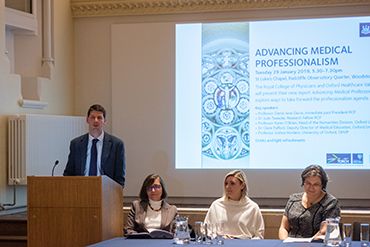Advancing Medical Professionalism
A new report by Oxford University’s Healthcare Values Partnership and the Royal College of Physicians aims to support doctors’ satisfaction in their profession and promote innovative, high quality healthcare for patients.
How then should we prepare and educate students and junior doctors for modern medical practice? Advancing Medical Professionalism (AMP), argues that enabling and supporting doctors to develop their professional identities is an important part of the answer and outlines practical approaches to support this.
The report was developed by Oxford University’s Healthcare Values Partnership and the Royal College of Physicians (RCP), building on the RCP’s previous work on professionalism and research by Oxford University Theology Faculty on compassion and the values of healthcare organisations. The process involved a series of workshops and discussions with patient representatives, academics and health care practitioners to find out what medical professionalism should involve now and in the future.
These consultations helped to identify seven key aspects of doctor’s working lives essential to professionalism and practical strategies and approaches to promote professional values, skills and attributes in each area.
Seven key aspects of professionalism. Doctor as:
- Healer
- Patient partner
- Team worker
- Manager and leader
- Patient advocate
- Learner and teacher
- Innovator
Professor Joshua Hordern, of Oxford University Faculty of Theology and Religion, Harris Manchester College and the Oxford Healthcare Values Partnership, sits on the RCP Committee for Ethical Issues in Medicine. He co-authored the AMP report with Dr Judith Tweedie and Professor Dame Jane Dacre (former President, RCP). Hordern says: “Most doctors go into the profession with a strong sense of vocation and commitment. But heavy workloads and the increasingly complex context in which they practice take their toll. We hope the approaches in AMP can support doctors in developing their vocation and professional identity, and refreshing their joy and confidence in the work they do. We also hope that the report’s practical ideas for institutional culture and practice will enable organisational leaders and managers at all levels to support doctors in sustaining their professional identity over the long-term.”
Now Oxford Healthcare Values Partnership is working with colleagues in Oxford University Hospitals NHS Foundation Trust to embed the report’s approaches in clinical training and practice.
Funders: Arts and Humanities Research Council, University of Oxford Wellcome Trust Institutional Strategic Support Fund, Kingsley and Napley
